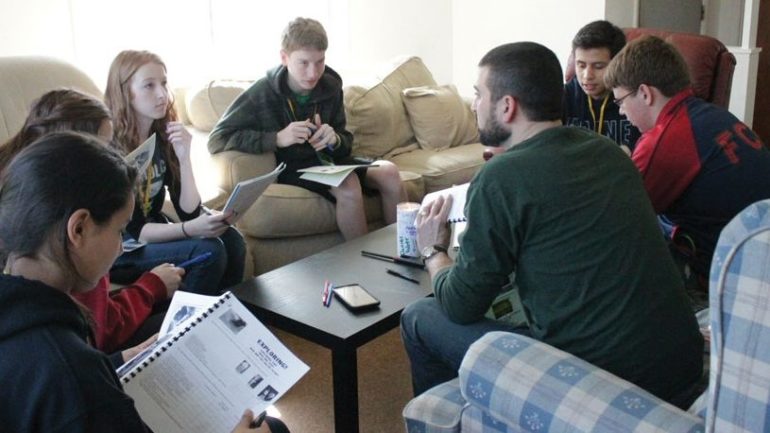And if I had been in a garage band, I think it would’ve felt a lot like leading a small group of senior highers in a highly charged conversation about Jesus. Because the best garage-band players are fearless in the way they integrate their distinct “voice” into the band’s collective “voice.” And [tweet_dis]the best conversations are fearless in the interplay of each person’s voice.[/tweet_dis]
In Thom and Joani Schultz’s book Why Nobody Wants to Go to Church Anymore (Group), “fearless conversation” is one of four “acts of love” that, they contend, are crucial to the future of the church. [tweet_box design=”default” float=”none”]”In its simplest form, this act of love means we listen. To listen we allow two-way conversation. An honest, authentic, two-way dialogue is amazingly refreshing in a culture that craves conversation.”[/tweet_box]
Conversation is the field in which all good things grow. And since fearless conversation offers the best soil, it grows the best crops. My experiences in fearless conversation with our eight high schoolers has reiterated for me the crucial practices that morph a small group into a garage band, including:
• Our job is to pay “peculiar attention.” The corollary to Jesus’ “You don’t have because you don’t ask” is this: “You don’t understand because you don’t pay attention.” Paying attention—or paying attention so well that you could call it “peculiar”—is one of the greatest acts of service we can offer one another. Most people, most days, don’t have anyone paying peculiar attention to what they say. Be more peculiar.
• “Fearless” means asking demanding questions. I don’t mean we ask questions in a demanding way; I mean we ask questions that make students wrestle with the truth, and with Jesus. One of my favorites: “Why did Jesus treat the Canaanite woman in Matthew 15 so harshly?” This is the sort of question that forces us to slow down and pay attention to Jesus—to wrestle-out the dichotomy between our assumptions of him and the reality of him. Good questions surface courage in our responses.
• We subversively guide the discussion by asking great follow-up questions. My rule of thumb in any conversation is simple: Always ask one more follow-up question than you normally would. When we pursue past our normal boundaries, we unlock treasure. And when an answer seems out of place or is flat-out ridiculous, we can re-direct the flow of the conversation by asking a follow-up question like: “If __________ is true, as you say, then how can _________ also be true?”
• We ignore false humility and pride to tell our own story. It’s tempting to gravitate to extremes in conversations—either false humility makes us hang back, or we dominate because of pride. We’re called to live in the holy middle between these extremes—if we expect students to share their raw story, we must share our own.
• Courage demands that we expose over-simplified or poorly reasoned responses and ask students to “take another shot at it.” C.S. Lewis’ razor intellect was molded by the tutor he lived with for years—the man nicknamed “The Great Knock” (William T. Kirkpatrick). Nervous about meeting the man, Lewis attempted some awkward conversation: “I said I was surprised at the ‘scenery’ of Surrey; it was much ‘wilder’ than I had expected. ‘Stop!’ shouted Kirk with a suddenness that made me jump. ‘What do you mean by wildness and what ground had you for not expecting it?'” It might be too risky to respond to kids the way the Great Knock would, but gently encouraging them to think better makes for more fearless conversations.
• We celebrate fearless insights when we hear them. Nothing fuels fearless conversations more than celebrating the fearless things kids say. Once, when I asked a group of students to “sum up” their experience of Jesus in Matthew 15, one girl stood up and said: “Jesus is a badass.” I told her I’d never given a reward for an answer to one of my questions, but I’d make an exception for that one.

